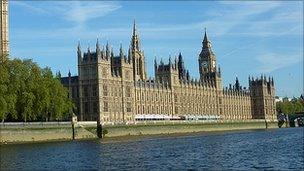Political lobbying: The current rules for UK MPs
- Published

There have long been calls for a tightening of the rules on lobbying of politicians but plans for a statutory register of lobbyists have yet to make it into the government's legislative agenda.
But what are the existing regulations on political lobbying?
All MPs, including ministers, are subject to a code of conduct when it comes to their outside interests and dealings.
They can:
Be paid to act as a director, consultant, or adviser, or in any other capacity, whether or not such interests are related to membership of the Commons.
Be sponsored by a trade union or any other organisation and receive hospitality in the course of their parliamentary duties.
They must:
Disclose their financial interests in a Register of Members' Financial Interests
Draw attention to any relevant interest when speaking in the Commons or corresponding with ministers, departments or executive agencies
Live up to the general principles of public life outlined in the code
Take decisions based on the public interest not for their own financial benefit or for that of their family or friends.
Not place themselves under any financial obligation to outside individuals or organisations.
Make appointments or award contracts on merit not on any other basis.
Be accountable for their decisions to the public and submit themselves to whatever scrutiny is appropriate
Be as open as possible about all decisions and actions they take.
Declare any private interests relating to their public duties and to take steps to resolve any conflicts arising in a way that protects the public interest.
Not act as a paid advocate in any parliamentary proceedings. They should not take payment to speak in Parliament, to vote a certain way, to introduce legislation, to amend legislation or to urge others to do so.
Not lobby for "reward or consideration" on behalf of any organisation with which they have a declared financial interest.
Be open with other MPs and officials about their dealings with any organisation with which they have a financial relationship, including activities which may not be a matter of public record such as informal meetings and functions.
Not use information which they receive in confidence in the course of their parliamentary duties for financial gain.
In addition, ministers must comply with guidelines when they leave office:
For two years after leaving office, they must get the approval of the Advisory Committee on Business Appointments for any appointment or employment they wish to take up.
They are expected to accept the committee's advice.
Former Cabinet ministers must normally wait three months after leaving office before they can accept any kind of paid employment.
Former ministers should not lobby existing ministers on behalf of any organisation for which they are employed for two years after leaving office.
- Published22 May 2013
- Published6 December 2011
- Published17 October 2011